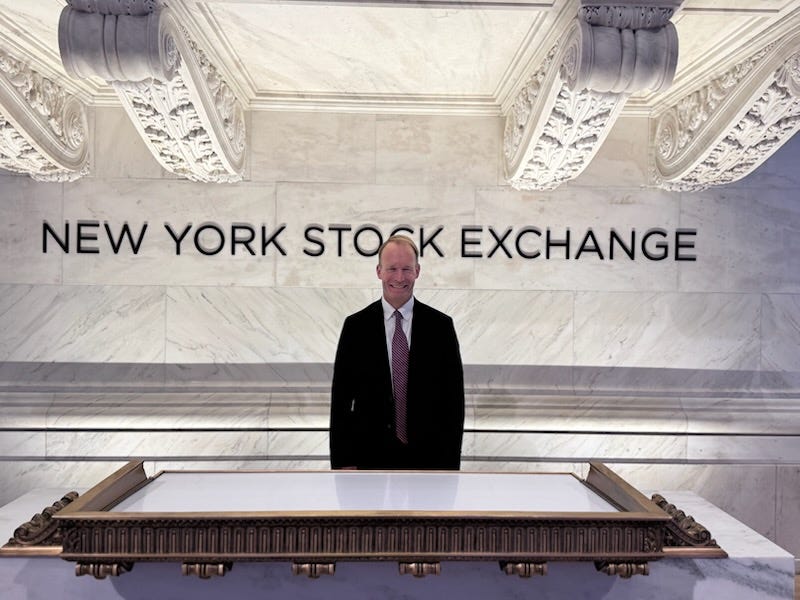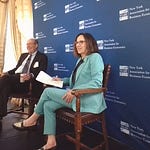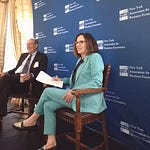Ben Emons, founder of Fedwatch Advisors, is known for taking every kind of news from Federal Reserve meetings to this past weekend’s U.S. bunker busting attack on Iran’s three main nuclear plants and weaving all the facts together to create a daily tapestry that explains what the latest events mean for markets.
This is why after President Trump surprised the U.S. and the world with Operation Midnight this past weekend, sending bombers loaded wth MOPs (Massive Ordinace Penrtrators) to drop 30,000 bombs on three of Iran’s main nuclear facilities buried deep in mountainous terrain I immediately reached out to Ben.
Would Iran try to close the Strait of Hormus where approximately 20 million barrels of oil representing 20% of global petroleum flow through every day? Or would blocking the flow of oil be like shooting themselves in the foot as this major producer would lose much needed revenues at a time when it enters into an expensive conflict?
” And so the question really is, can Iran truly blockade that strait? And I think this is why the oil prices have tapered off from from the initial shock that that maybe it could happen,” he explains to me. “But it's not like a like a high probability at this point. So it's more about Iranian oil being completely off the market, maybe for a while.”
For now, with the initial shock of the U.S attacks on Iran being digested rather smoothly by markets around the world, Ben says investors are going to return to turn back to the big question: “What’s the macro trend from here?…we do have central banks that will react to this so my feeling is that we will get an impact on inflation which will make central banks more reluctant to take action near term.”
In particular what we will hear from Fed Chair Jay Powell as he testifies twice to Congress this week? Keeping his finger on the pulse of the Fed Ben notes that two Fed governors, first Chris Waller last week afeter the FOMC meeting and now Michelle Bowman have said they may be ready to discuss rate cuts as early as the July meeting.
So dive in and heat why he sees the consensus at the Fed probably needs to see two to three months of good news on inflation then they’ll “pull the trigger” on rate cuts which means there will probably be no such moves until September.
Iran weighs its options- none of them good 00:02:14.580
The irony of this situation is that if Iran were to put up a full blockade and completely block off that strait, they would affect their own economy very dramatically. But that may be the stakes of the game for them, in order to put maximum pressure on us and Israel to stop attacking. and then subsequently, you know, force in this diplomatic outcome ultimately to get back to the table. So. Iran seems to be in a situation currently of being very weakened. In a situation of not able to respond adequately to these attacks. But this is an option that they have now. How they will do that? That's a bit unclear. I mean, they could use these Houthi rebels there to disrupt the traffic.
Some ships are turning around- 00:02:39.800
You have satellite images of these ships turning around. There was news earlier today. Presumably two Chinese supertankers, apparently moved, moved away there, perhaps staying out of the hot zone for now. But you know, if the Iranians themselves go in there with gunboats and things like that, there are SU aircraft carriers there in the in the region. So, the US could strike quickly.
Could Iran do it? 00:03:30.890
The question really is, can Iran truly blockade that strait? And I think this is why the oil prices have tapered off from the initial shock that that maybe it could happen. But it's not like a high probability at this point. It's more about Iranian oil being completely off the market, maybe for a while that that was reflected in the price search that we saw on Brent earlier early overnight, and then tape was off right. And then we just sort of sit here waiting, idling about. What's Iran's next move?
Market reaction so far seems appropriate 00:05:20.890
On the one hand I felt that the market was responding today about okay, Iran has been ‘de-nuked,’ right. In other words, they have been set back in their abilities to generate a producing nuclear weapon near term, like literally within weeks. They can't do that right now. It's probably set back by at least 6-months, maybe a year. That's what the Us. Intelligence has been saying. That's probably the most reliable source that markets would have.
Do we know what happened? 00:05:55.850
There's a lot of satellite imagery available. Now to see what these sites look like, you can clearly see damage and destruction. But we don't really know how far these Bunker Buster bombs have penetrated really deep on the ground to affect the nuclear centrifuge, so to speak, where the real enrichment takes place. We can at least say that that there's been a significant damage here and now, and that therefore Iran's abilities, capabilities for nuclear enrichment have been set back significantly, at least for the time being. So the tail risk of nuclear warfare, I think, is away from us is not going to happen.
Oil prices have been rerouted out of their downtrend 00:07:31.190
I feel more and more that this year 2025 starts to shape up like 10 years ago, similar kind of year. Lots of geopolitical tension, lots of fluctuations, lots of speculation with the fed will do how the economy will fare. In this case with the Iran playout. Then, it was with China, you know, so it makes it very choppy. And so you're getting these sorts of swings around with not much overall direction. We recover from the shock of the tariffs, but we're sort of ranging now in the stock market. Same with bonds, a little bit lower, but not much significance. The only thing that has been changed, because of this event is that Brent has clearly broken out of this downtrend that is in place since 2020. That's, I think, significant. Because if you think back of the Ukraine war, when we also had a made even bigger surge in oil prices at that time. Oil price at that time that did start to decline afterwards. But interest rates start to pick up quite significantly, because the spike in oil led to this higher high inflation we saw in 2022. So I think with this event, we have somewhat similar like, we're getting a breakout out of the downturn for Brent
Oil and higher inflation are issues 00:08:42.570
Because of this Macro shock, we do have risk premium in the oil markets. What is the follow up exactly here? And what does this, then, mean? Oil prices will be the 1st channel that will reflect the risk of this particular situation; it is unlike currencies or interest rates. Those will react secondarily when Brent has broken out. We may be dealing with somewhat more sustained rise in oil prices. Take that to the Fed model that's been put out of it by others. The sustained rise in oil prices, say over $10, which we're kind of at, for the moment. can add about a few tenths of percent to the CPI. So, I do think markets are looking at a potential risk of inflation, at least temporarily,
Military action may been the road to diplomacy- 00:11:55.540
Maybe, this is the road to diplomacy, right? And, in other words, we take the military action, we take the nuclear capability out - to an extent - so it becomes digested in the news headlines. So, something else more extreme has to happen for it to be really relevant again. I think it's more data watching and Fed watching. You know where we go from here.
Will Iran always have some outlet though which is can sell oil? 00:13:24. 810
Iran can still continue to smuggle, so to speak, oil out of its country to other areas, and continue to fund there for its operations in Iran, which it probably has to, because without the oil it can't do anything else. It doesn't really have anything.
Iran’s oil is off market 00:14:29.660
The oil that Iran produces, which is 1.5 million barrels a day, which is very significant. it is actually off the market, and you know we. We won't see it until we actually see it. : I do think that will continue to go on because China relies on that oil to an extent. Russia, as well.
Lots of noise and worry but then…nothing 00:15:50.770
There are a lot of tariffs on the table, but they don't fully materialize yet. They create this day-to-day noise that markets have to, you know, digest, and try to figure out like, what's the real macro trend from here? And so ultimately, it's about the economy, I think, is always really about the world. Economy has not shown significant slowdown from any of these events. So far. Central banks will react to this. So my feeling is it that we will get an impact on inflation which will make central banks more reluctant to take action near term, maybe including the Federal Reserve…even as much as Michelle Bowman and Chris Waller were out there making a case for July cut.
Gold is a hedge against the unknown not just inflation 00:18:37.170
The gold price will continue to be bid up, so to speak, meaning this, the uncertainty that we just discussed today. There's and what's happening with Iran are quite exogenous. And really gold is sought out to hedge those risks. It's not even inflationary risks that people are trying to hedge is just the unknown and unknown that people use gold for to hedge as opposed to the dollar. It's much more linked to the US. Economy, which is vulnerable
Some Fed members looking for early rate cuts 00:24:18.790
Waller himself said, and that good news cut means this is that inflation is indeed on a trajectory really down, sustainably going down, and then the interest rate becomes more restrictive than it has to be. So you can cut rates. That's the good news cut. That's actually what they were on for a little while, until we had to care for this oil disruption situation -until you're back on track that you can actually get to the good news cut outcome. I think Powell wants to do that that way. Bostick has said this, others have said this. So it's really you have 2 outliers now, and that's the debate within the FOMC. I think it’s very natural to have people calling for cuts. but they will likely not happen until they are back on track to see two or three more months of this good news cut kind of inflation data. Then we'll pull the trigger. So, I still think that the market and the fed are aligned in terms of the outlook for this year that you could have 2 cuts, but they really are more in the latter half, meaning, as of September. I think.
Good news rate cuts are possible 00:26:18.180
At some point the conflict will not have as much effect anymore on oil prices, and the tariffs; this is being digested. It all then depends on how the economy has responded to it. If the economy is significantly weakened in the meantime, and unemployment does change. I do think that the Fed will be swayed to move, to cuts a little quicker. Conversely, if not, they will stay on hold. How I come out is that the two cuts that they forecast in the dot plots could happen, but it has to be that good news cut story. In other words, you have to see the kind of inflation reduction with the unemployment rate not changing a whole lot.
Ben Emons
FedWatch was originated as a quantitative investing project to improve the filtering of Fed speak for investment strategies.
Ben holds an MBA from the University of Southern California Marshall School of Business and a master’s degree in international finance and monetary economics from the University of Amsterdam. He is a certified financial engineer from Columbia University and a CFA and CMT program candidate.
He has extensive experience in fixed-income and derivatives trading, as well as portfolio management. He held sell, buy, and fiduciary roles, specializing in multi-asset fixed-income, equities, private credit, High Yield, structured credit, and special lending. He is a managing director and registered investment advisor as well as a registered representative at Farther and Cetera Advisor Networks.
He has managed global and core plus fixed-income strategies and funds and separately managed accounts for central banks, sovereign wealth funds, pensions, insurance companies, and qualified purchasers’ investors.
He is the author of The End of the Risk-Free Rate, The Financial Domino Effect, and Mastering Stocks and Bonds. He advises advisory platforms, wealth management, family offices, and RIAs on Outsourced CIO services and provides insights on interest rate overlays for hedge funds and money managers.
He is a frequent guest on CNBC Fast Money, Worldwide Exchange, and CNBC Asia, as well as Bloomberg Surveillance, Bloomberg the China Show, The Close, TD-Schwab Network, CNN, and Asian networks such as CNA and RTHK Radio.
Innovative Investing in the Fed














Share this post